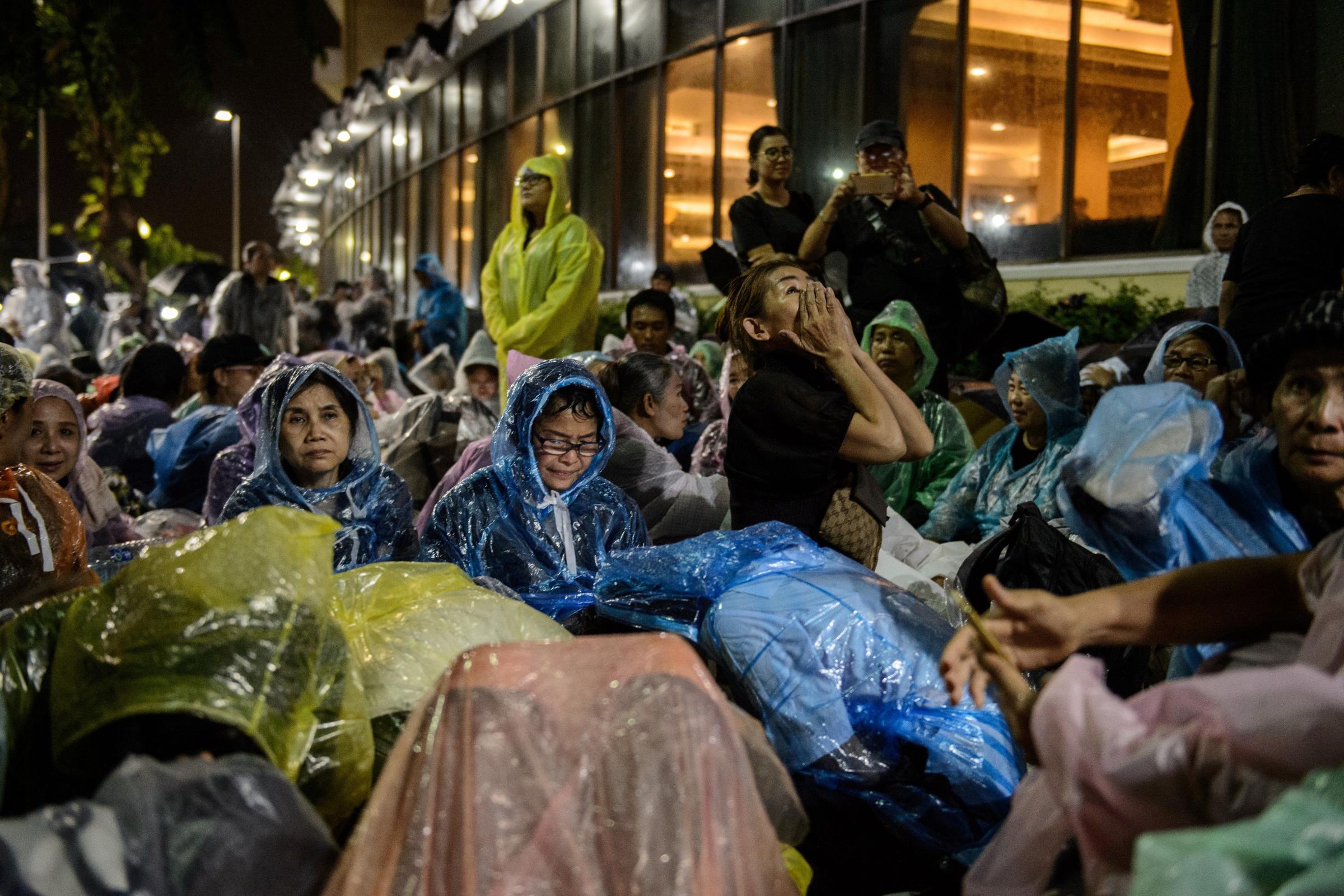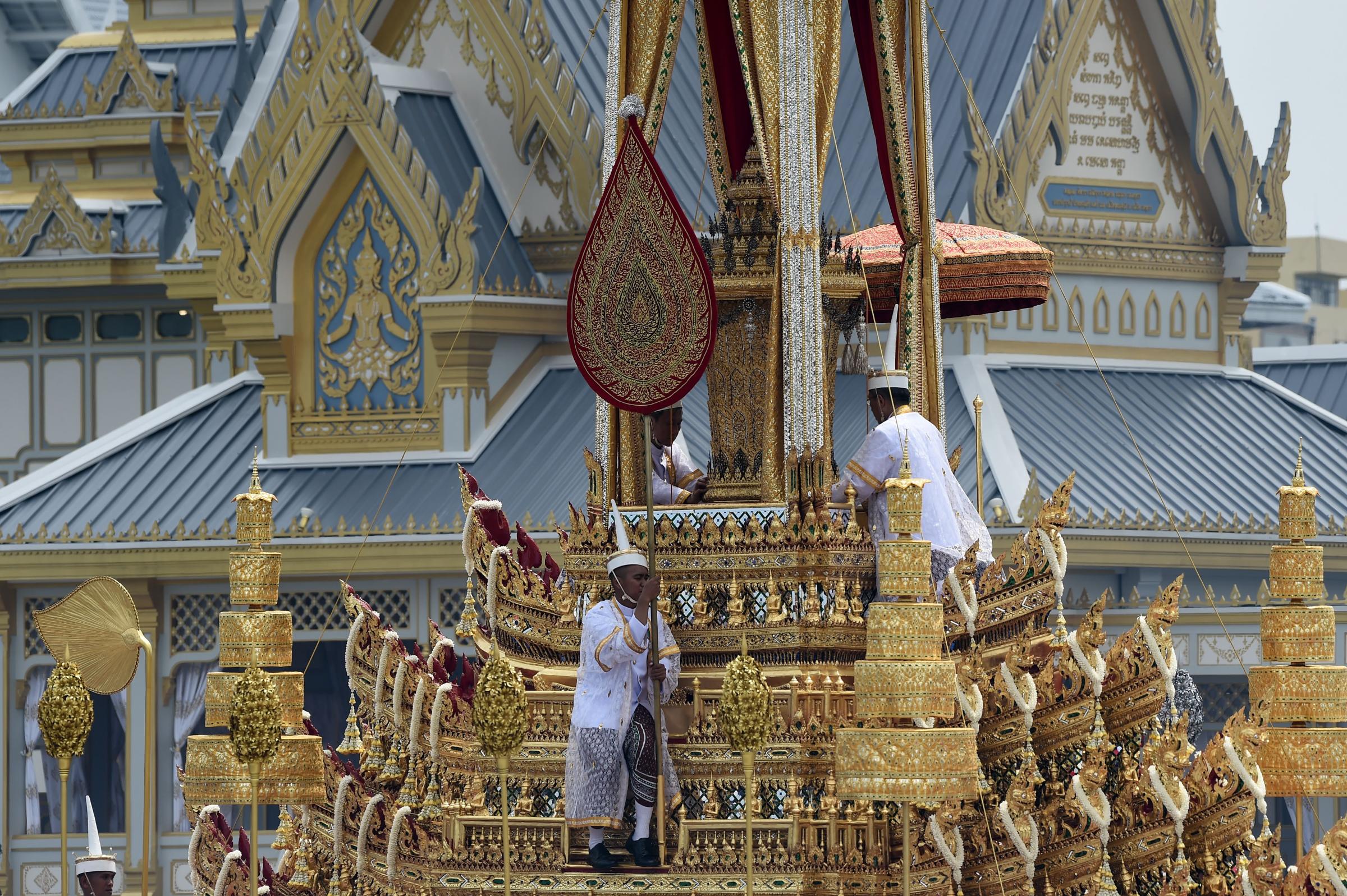In a lush open field in front of Bangkok’s Grand Palace, the nine spires of a gleaming structure stretch toward the misty sky. At the center of this three-tiered royal crematorium — painstakingly carved from sandalwood and designed with murals by Thailand’s top artisans over the past year — is the funeral pyre of the late King Bhumibol Adulyadej.
Thais all over the country will officially bid farewell Thursday to their beloved monarch, who took his final breath on Oct. 13 last year at 88 years of age. Reigning for seven decades, King Bhumibol was the world’s longest-serving monarch, and few Thais alive today knew a crowned sovereign before him.
The burning of the pyre, scheduled for 10 p.m. local time after a symbolic cremation ceremony, will mark the end of a year of mourning and the beginning of a new era — one overseen by his son King Maha Vajiralongkorn.
Long revered as a divine figure throughout the country, Bhumibol was regarded by his people as the very definition of kingly benevolence, devoted to his subjects and his nation’s progress. Etched in the minds of Thais’ is the enduring image of the bespectacled King in modest clothing, carrying a notebook and camera, concentrating on some agricultural conundrum against a rural backdrop, far from Bangkok’s elites. Since his death, this representation has proliferated throughout the country — in murals, outsized billboards, and on TV.
Read More: Thailand Bids Farewell to Beloved King Bhumibol Adulyadej
This is what Thais reach for a year on when speaking about King Bhumibol. “Since we were young until now, everybody could see how he worked to do everything for the people,” said Pui Wongsuthee, 68, on the anniversary of his death, as she traveled by ferry to the Grand Palace to pay her respects. “He didn’t act like he was above us — he was with us, he ate with us. Everybody loves him very much.”
Wongsuthee is one of 13 million who went to the Grand Palace to pay their respects before it was closed earlier this month in preparation for the royal funeral rites. In recent days, many citizens have donned all-black attire; local newspapers reported on every tiny detail of the $90 million royal funeral prep — including how two sculptures of King Bhumibol’s favorite pet dogs, Thong Daeng and Jocho, will be placed alongside the pyre.
Meanwhile, since Monday, hundreds of people have camped out on pavements around Sanam Luang, the cremation site, enduring inclement weather in hopes of reserving a spot with a good view of the royal procession.
By 7 a.m. Thursday, as the Bangkok air was already thick with humidity, more than 110,000 people gathered around the Grand Palace, according to an official government website. That number is expected to grow as the day continues.

Across the Chao Praya River, Siriraj Hospital — where the late King had spent much of his convalescence before passing — was a flurry of activity as volunteers handed out bottled water, snacks, orchids, and vials of herbal oil to revive any mourner who might be feeling faint under Bangkok’s blazing sun. Thousands of people waited patiently in a line that spilled out of the hospital’s premises, with mourners hoping to place a single sandalwood flower by a portrait of the King.
Paisan Jaroenchon, 44, told TIME that he feels he is lucky because he was born in Siriraj, a place so closely associated with King Bhumibol. He said that in his youth, he had missed a chance to meet the King because he didn’t study hard enough to get into Bangkok’s prestigious Chulalongkorn University, where Bhumibol handed out diplomas to young graduates.
“I feel like if I had worked harder, I could have gotten into Chulalongkorn University, which means I could have received my certificate from the King. That is the only time in my life that I would have had the chance to be near him,” Jaroenchon said. “This is my deepest regret, and I only realize it now that I am older.”
Roads around the Grand Palace were blocked off by security checkpoints with metal detectors for the black-clad human traffic. It ballooned around Mahachai Road as people waited to enter Wat Thepthidaram to pay their final respects. Students outside handed out black rubber wrist bands that read “We love Dad.”
For many in attendance, this is not their first time waiting in line to pay tribute. Orapun Pinyo, 54, said that she has been to the Grand Palace five times this year. Her longest wait for a visit was 12 hours. “I just felt happy to sit and wait to get inside,” she said.
Unlike her fellow mourners, Pinyo has actually seen King Bhumibol in the flesh. The first time was as a seven-year-old, when he passed through her home province of Chumphon in southern Thailand in a train carriage.
Three years later, she got her second chance. “The King went to Chumphon province to build a dam. I waited on the road for the royal procession. I believe that dam helped to prevent floods in my province,” she said. “I was grateful to catch a glimpse of him — he was wearing a suit.”

According to Thai tradition, Thursday is the day when the nation will witness the King’s spirit ascending to heaven, according to deputy government spokesperson Weerachon Sukhonthapatiphak. “But many Thai people believe that he won’t go too far. He will be looking down to look after and watch the people from above,” Sukhonthapatiphak told TIME. “He will forever be our legacy.”
Part of his legacy is less rosy. Bhumibol may have been well-loved, yet the country’s draconian lèse-majesté law — among the strictest in world — has silenced any criticism of him and his son. A controversial figure, 65-year-old Vajiralongkorn has a reputation marked by scandal. Yet any anxiety that the average Thai citizen may have toward his incoming reign cannot be voiced, even online, as this could attract a stiff jail sentence.
While these laws may protect the royal family from defamation, human rights groups say that they are deployed by the military government as a political tool, and cases have surged to more than 100 since the coup d’etat in May 2014. Most recently in June, a 34-year-old man was sentenced to 35 years in prison on 10 counts of lèse-majesté for a Facebook post, while another court ruled in August that a Thai activist will spend two-and-a-half years behind bars for posting a BBC article perceived to be insulting to the monarchy.
Spokesperson Sukhonthapatiphak played down concerns over the incoming monarch, saying that the nation’s goodwill for King Bhumibol will be extended to his son. “Everything we feel for the late King will be carried on to the new King,” he said.
“He can just carry on and follow in his father’s footsteps.”
With reporting by Kirana Kittikoonthana / Bangkok
More Must-Reads from TIME
- Donald Trump Is TIME's 2024 Person of the Year
- Why We Chose Trump as Person of the Year
- Is Intermittent Fasting Good or Bad for You?
- The 100 Must-Read Books of 2024
- The 20 Best Christmas TV Episodes
- Column: If Optimism Feels Ridiculous Now, Try Hope
- The Future of Climate Action Is Trade Policy
- Merle Bombardieri Is Helping People Make the Baby Decision
Contact us at letters@time.com